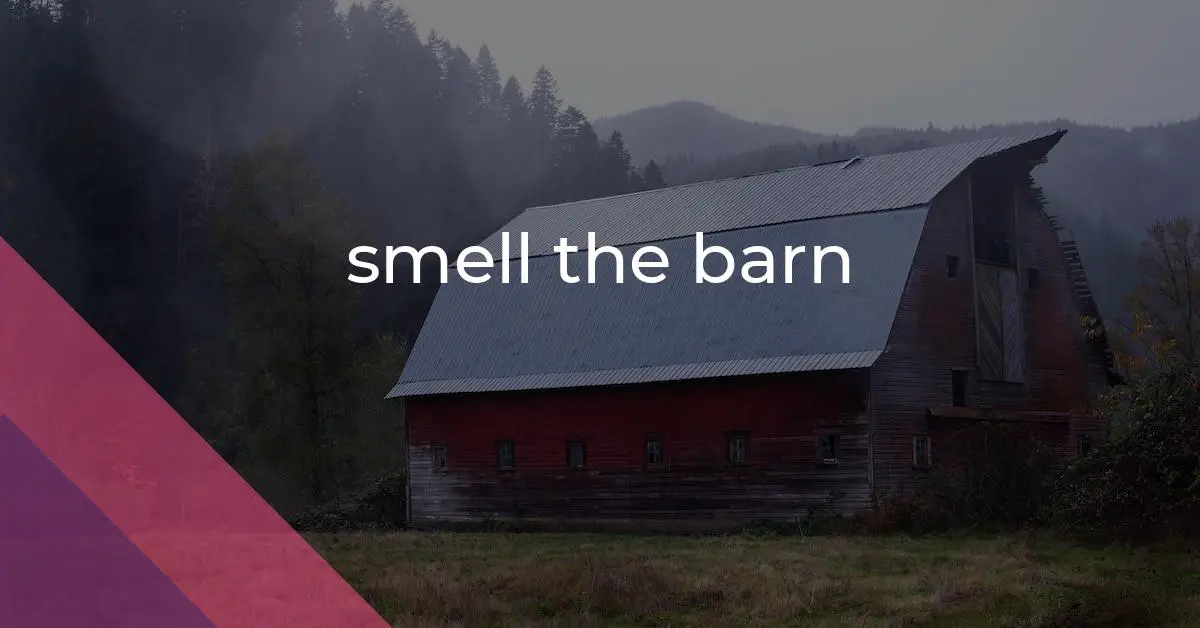smell the barn: Idiom Meaning and Origin
What does ‘smell the barn’ mean?
The idiom "smell the barn" means to sense the nearness of the end or the completion of a task or journey.

Idiom Explorer
The idiom "the nose knows" means that one's sense of smell can accurately detect or recognize something, even when other senses or evidence may be lacking.
The idiom "the end of one's rope" means to reach the limits of one's patience, stamina, or resources, with no more options or solutions available.
The idiom "the chickens come home to roost" means that negative consequences or troubles from previous actions will eventually catch up to a person.
The idiom "the cat's out of the bag" means that a secret or hidden information has been revealed or made known to everyone, often causing surprise or a negative outcome.
The idiom "the box they're going to bury it in" refers to the final resting place or ultimate outcome of something. It implies that the situation or matter will be closed or resolved completely.
The idiom "sweet smell of success" refers to the feeling of accomplishment or triumph, often associated with achieving one's goals or becoming successful in a particular endeavor.
An idiom meaning to leave or depart, often used to describe ending a project or leaving a place quickly.
Meaning: To take time to appreciate and enjoy the small and beautiful moments in life.
The idiom "stink a skunk off a gut wagon" means to have an extremely foul odor that is difficult to get rid of. It implies a strong and persistent stench that is hard to eliminate, much like the smell of a skunk on a garbage truck.
Enigmatic Origins
The idiom "smell the barn" is a phrase used in American English to indicate the sense of returning home or being near the end of a journey or task. The origins of this idiom can be traced back to the early 20th century and its usage has primarily been in rural and agricultural contexts.
This idiom is derived from the literal act of smelling the barn, which refers to the distinctive scent commonly found in agricultural settings. Barns, often filled with livestock, hay, and manure, have a distinct smell that is familiar to those who have spent time in such environments. This aroma has become associated with the end of a long journey or a day's work in the context of farming and rural life.
The phrase "smell the barn" is typically used to convey a sense of near completion or the imminent attainment of a desired goal. It signifies the moment when someone can sense that they are getting close to finishing a task or returning home after a long journey. In a figurative sense, it represents the anticipation and relief that comes with reaching the final stages of an endeavor.
This idiom is often used in a positive or hopeful manner, suggesting that the end is in sight and success is within reach. It can be used in various situations, such as sports competitions, work projects, or personal journeys. By invoking the imagery of a familiar smell associated with home or the end of a task, "smell the barn" evokes a sense of comfort, familiarity, and the promise of completion.
In comparison, the idiom "smell a rat" has a different connotation altogether. "Smell a rat" means to detect that something is suspicious or not quite right. While "smell the barn" signifies progress and nearing the end, "smell a rat" suggests caution and a need to investigate further. The latter idiom is often used in situations where there is a sense of deception or hidden motives.
Similarly, the "smell of the shop" is another idiom that is unrelated to "smell the barn". "Smell of the shop" refers to the distinct aroma associated with a particular business or trade. It can convey the idea of professionalism and expertise, as well as the unique atmosphere of a specific establishment. This idiom is often used to describe the sensory experience of being in a place of work or business.
On the other hand, the idiom "smell of the lamp" has a more metaphorical meaning. It refers to the scent of oil or the burning of a lamp while studying or working late into the night. This idiom is often used to describe someone who is dedicated, hardworking, and willing to put in the effort required to achieve their goals. The "smell of the lamp" suggests a commitment to learning and striving for excellence.
Another related idiom is "smell blood", which conveys a sense of detecting weakness or vulnerability in a person or situation. This idiom is often used in competitive contexts, such as sports or business, to describe the moment when someone recognizes an opportunity to gain an advantage or achieve success. "Smell blood" can also imply a ruthless or aggressive attitude towards achieving one's goals.
In contrast, the "smell test" is a more informal idiom that is used to determine the authenticity or legitimacy of something. It refers to an intuitive or instinctive assessment of a situation or claim. If something doesn't pass the "smell test", it raises doubts or suspicion. This idiom is often used to describe a gut feeling or intuition that something is amiss or not as it seems.
While primarily used in rural or agricultural contexts, the phrase "smell the barn" has gained some popularity in general American English, particularly in regions with strong ties to farming and rural life. Its inclusion in American idiomatic expressions reflects the significance of farming and rural traditions in shaping the cultural landscape of the United States.
Overall, the idiom "smell the barn" encapsulates the idea of nearing the end of a journey or task by drawing on the sensory experience of a distinct scent associated with rural life. Its usage adds depth and color to the English language, providing a unique expression to convey the sense of completion and the anticipation of reaching a desired goal.
Example usage
Examples of how the idiom "smell the barn" can be used in a sentence:
- After a long day of work, I could smell the barn and was eager to go home.
- With only one lap to go, the race car driver could smell the barn and pushed harder to maintain his lead.
- As the final exams approached, the students could smell the barn and started studying intensely.
More "Origin" idioms



